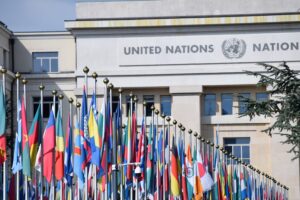
In light of recent events in the Gaza Strip, along with numerous other consequential developments around the world, many Americans have become disinvested from the debate surrounding American involvement in countries abroad. Looking at the traditional American political spectrum, it is safe to associate American isolationism with those on the right and American liberalism with those on the left. Yet, a recent history of American foreign policy failures has stained the psyche of the American public, especially the Iraq and Afghanistan wars, causing widespread disengagement from the American electorate.
The United States’ history of westward expansion, benign political neighbors and the staunch belief in a settled North American continent provide considerable historical pretexts for isolationism. While some journalists like Jim Hoge, former editor of Foreign Affairs magazine, give the reason for America’s pioneer phase of manifest destiny to explain Americans’ overall disinterest in international affairs, many fail to recognize the impact of America’s disastrous foreign policy in the Middle East and abroad. Not until the 9/11 terror attacks had there been a targeted political attack on American soil since the War of 1812, which both induced sharp spikes in Americans’ interest in international affairs.
America has stable relations with its few immediate, one of which it shares the world’s largest land border with. This is an extreme rarity in the international sphere because many countries border several nations and must work and negotiate with them to maintain peaceful relations. Despite the geographical implications contributing to maintaining adverse or agreeable diplomacy alike, it is important to consider this difference regarding the fraction of domestic impacts that have truly shaken the American public throughout their history.
Conflicts that resemble anything similar to Iraq or Afghanistan give Americans a reminiscent, bitter feeling of embarrassment and inefficiency. According to a fairly recent Gallup poll, 61% of voting-age American adults from either major political party believe the United States should have at least a major role on the international stage. A decline of over ten percentage points in 2017 was taken after the election of the United States’ 45th President, who was infamous for posturing himself with an isolationist and “America First” stance. Some of the Republicans’ policy fixtures in 2017 promised to pull America out of its longest wars in the Middle East, decreasing funding for NATO and embarking on a trade war with China.
For everyday Americans, displaying rational ignorance or placing trust in more well-educated politicians and groups of elites possessing the necessary knowledge and expertise for policy-making is an easy choice. Even though major foreign policy topics, including climate change and trade policy, directly impact the daily lives of many Americans economically, it is still insufficient in persuading those to stay attentive to international issues.
In a 2018 poll conducted by the CATO Institute, data analysis revealed that states where Donald Trump and the Republicans won with the largest margins in the 2016 election had a lower curiosity in foreign affairs, while the reverse was true for states with the lowest electoral support for Trump. This highlights a clear correlation between trust and attention, as voters who trusted Trump were less likely to engage with foreign policy.
As the most influential nation in the world, the United States holds enormous weight in the international sphere regarding military influence, humanitarian aid and economic leverage. While both political parties mostly agree that maintaining America’s influence and protecting its interests abroad is crucial to national security, their constituents mostly tether their vote to policy positions on domestic issues. This produces new leaders with clear domestic policy goals but convoluted and ineffective foreign policy initiatives. Thus, when an international crisis arises, world leaders will have to scramble to implement and advocate for effective policies.







